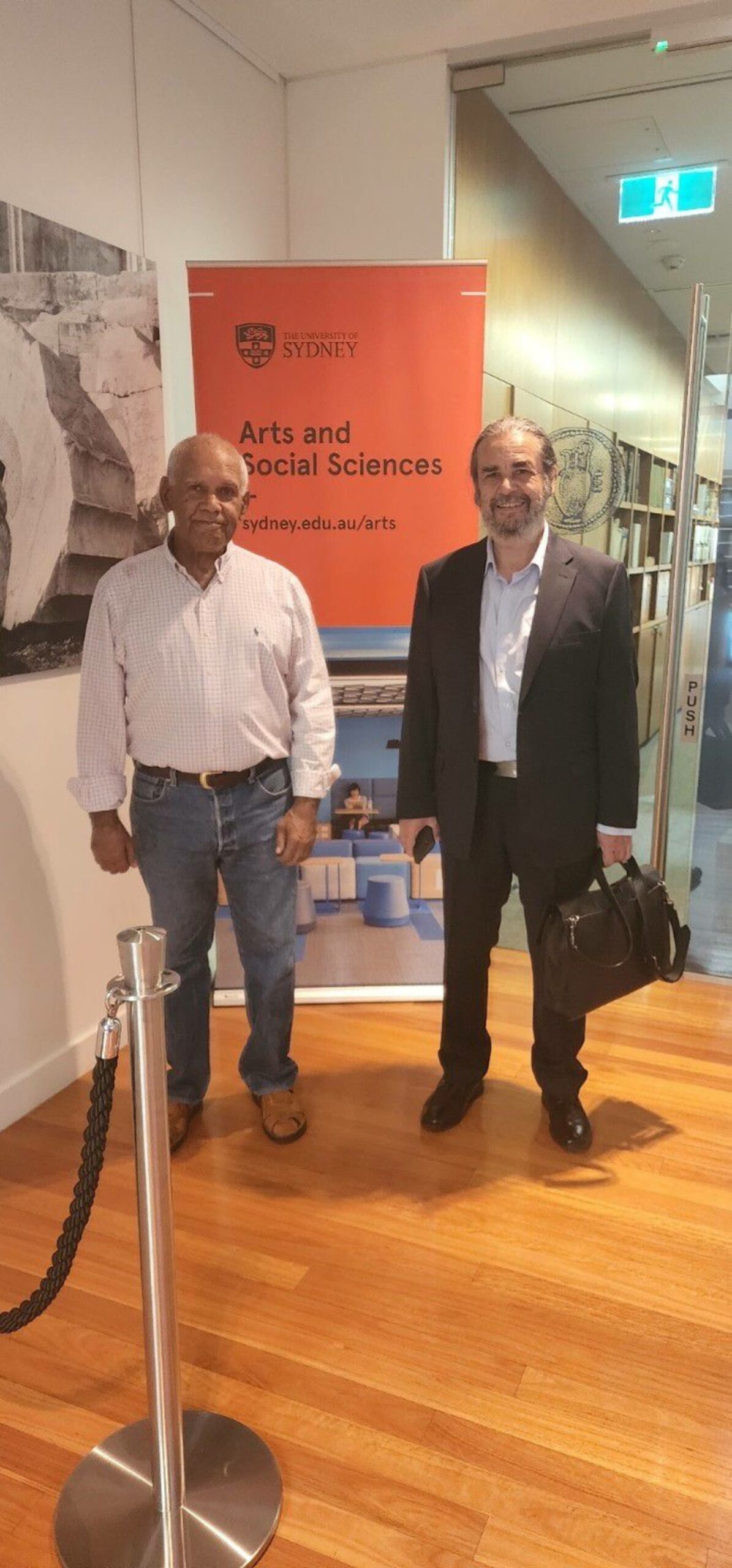As Australians later this year we will be asked to acknowledge our First Nations people in our constitution. As the kitchen table conversations begin, most of us will pause to evaluate our relationship with our First Nations people. Sadly, most Greek Australians know little about the longest-surviving culture on earth.
Our present opinions are clouded by a colonial system’s prejudice, whose objective was to imbue difference, not commonality. Despite being from completely different parts of the world, Greek and First Nation Australian cultures share common themes in their stories.
When Dr Vasilis Adrahtas presented Myths and Dreamings: Cross Hatchings between Ancient Greece and Indigenous Australia to the Australian Archaeological Institute of Athens, an opportunity was presented to reverse that. A chance to give a comparative analysis of two ancient cultures distanced by geography and time. What, if anything, did they have in common?
The talk was held under the auspices of the Consul General of Greece – Sydney and the consul general spoke of the parallel history of Greek Australians and our first nations people in a modern context. At the time, both were fighting against racism, their paths cross-hatched in the suburbs of Glebe, Redfern, and Newtown; unwitting in the understanding of each other’s fight for recognition.
Uncle Jimmy gave a Welcome to Country and said that despite what was written in the colonial history, “they did not give up their women, they did not abandon their children, and they did not walk off their land.”
Uncle Jimmy’s words about the struggles of his people over the last 200 years struck an emotional chord with the audience. First Nations people, despite the genocide, have managed to maintain their language, culture, and traditions, at first secretly, hidden and in fear, but today with pride.

Elders like Uncle Jimmy now stand with appropriate honours, to share their knowledge, and project their voices and their languages to be recognised and return to their cultural heritage, as rightful stewards so they can engage in truth-telling.
Despite this bloody history of genocide, expulsion and suppression, Uncle Jimmy stood on that lectern and Welcomed us to Country, he humbled us. He shared stories of growing up in Newtown, having just arrived from the mission and meeting Greeks. He felt an instant connection with the Greeks as he recognised an ancient people who were connected to the land from which they came despite the distance.
Dr Adrahtas spoke of the common themes in Greek myth and First Nations dreamtime, creation stories, mythical creatures, heroes, and life and death. The one that most resonated was the shared respect for what First Nations people call Country or, as the Greeks call it, Tόπος (Topos). Every ancient myth connected to the particularities of a place explained by stories handed down through oral tradition.
Like for the Greeks, Dreamtime, Country is connected to stories conveyed through song lines that traverse this continent, teaching and educating through oral traditions from one generation to the next. In both cultures, these stories of Topos/Country were always reflected in the stars. The ancient people of both cultures were our first cartographers that used stories of the land imprinted in the sky to navigate expanses of earth and sea, creating trade routes and cultural connections amongst ancient nations.
These stories consecrated the sacredness of the land whose safeguarding was bestowed on those people who belonged to it. At times the detail of why ancient land needs to be protected often lost relevance, diminished by the contemporary disconnection of people from the land. Still, there is an unconscious longing for one’s Topos.
As Greek Australians, this is well-known; no matter how many generations pass, when we return to ‘home’, Greece, be it the village of our great-grandparents, or Athens, we feel the unexplained connection, a feeling of coming home.
Why do we not understand this connection to the Country of our First Nations people; that same connection we feel to our Topos.
We fight to be recognised as custodians of those ancient lands, as do our First Nations people. We will often return to a village and pick up soil and run it through our fingers or run our hands against ancient stones. Imagine when that was denied to us; as when the over 1.2 million indigenous Hellenes were forced out of Asia Minor in 1922, in some cases, it is still denied to many.
Myths and Dreamings: Cross Hatchings between Ancient Greece and Indigenous Australia acknowledges the current yearning for presentations on such dialogues of learning and understanding. In those kitchen table conversations that will begin, maybe evaluate our common history of what we share and what we understand from each others history, as a closer look will tell us that we have more in common than what we have been told.
Theodora Minas Gianniotis is the Outreach and Engagement of the Australian Archaeological Institute of Athens









